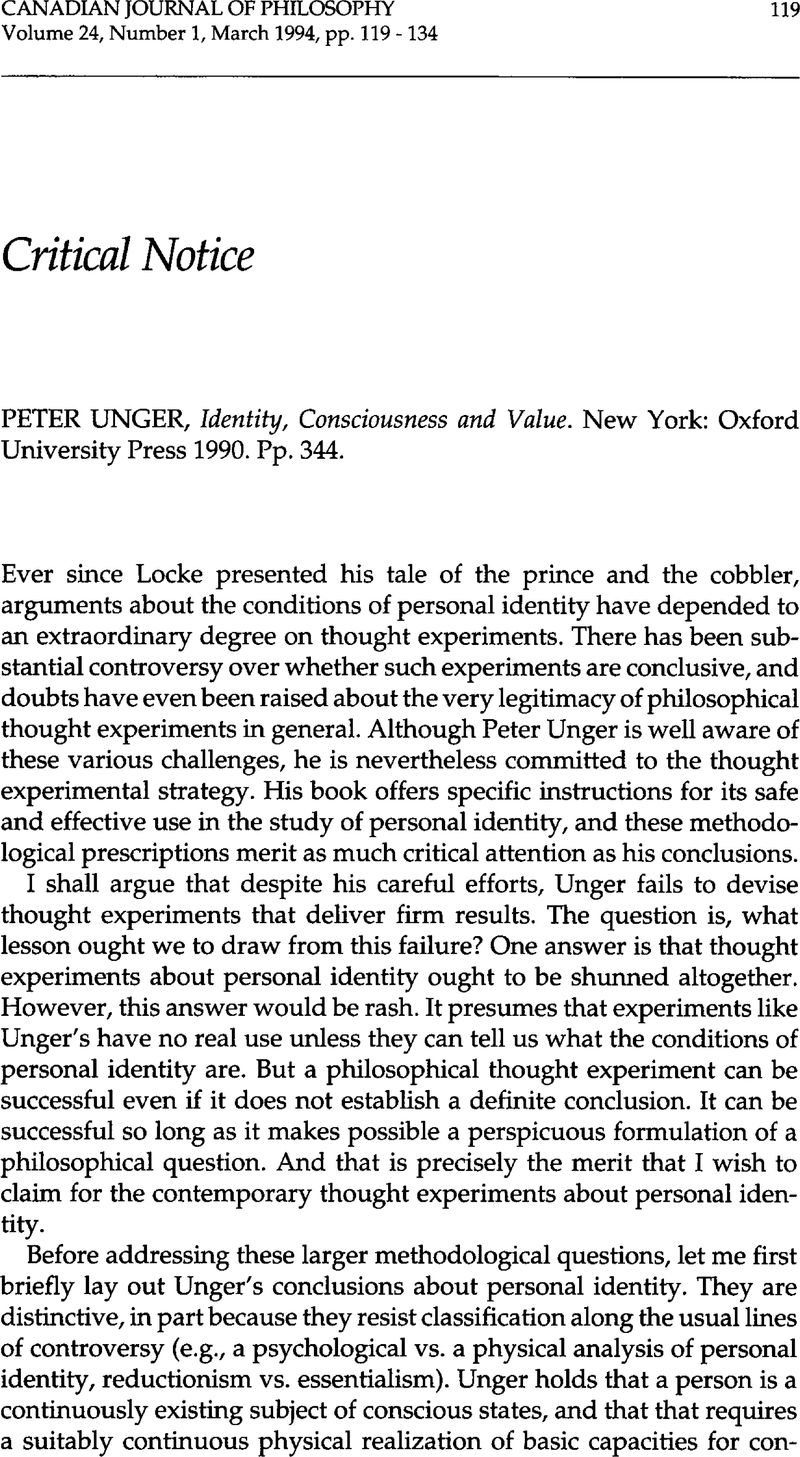No CrossRef data available.
Article contents
Peter Unger Identity, Consciousness and Value. New York: Oxford University Press 1990. Pp. 344.
Review products
Published online by Cambridge University Press: 01 January 2020
Abstract

- Type
- Critical Notice
- Information
- Copyright
- Copyright © The Authors 1994
References
1 More accurately, Unger holds that we deeply believe that a person is a continuously existing subject, etc. He is committed to a fairly radical conventionalism (and hence relativism) which mandates this qualification. Yet even non-relativists must base their arguments on premises believed true, and when they disagree with Unger about the substantive theses of his book it will not be on the ground that he is a relativist. Indeed, that feature of his metaphysical position is largely irrelevant to an evaluation of his specific arguments and conclusions about ‘identity, consciousness, and value.’
2 The analogy is not perfect according to Unger, and he has much to say about the differences between persons and ships. For him the main source of disanalogy is the idea that psychological capacities can exist only in systems that possess a high level and distinctive kind of integratedness. Despite the fact that ships possess their own distinctive organization, there is in his view no strict nautical counterpart to the integratedness of a psychological system. Consequently, a ship's parts need not be replaced so gradually as the parts of a person in order to preserve identity, because only the latter need time to be ‘assimilated’ into a continuously functioning and integrated system. Furthermore, a ship, but not a person, can survive complete disassembly, which means that a ship can, while a person cannot, survive a complete interruption of its capacity to function. This may be interpreted as owing to a difference in the kinds of capacity at issue in the two cases: unassembled parts of a ship might in some sense have the capacity to function together as a ship, while the bits of matter that go into a mind perhaps do not have in themselves (even when considered as an aggregate) the capacity to realize mental states. This purported difference in kinds of capacity once again seems to be due to the peculiar sort of systemic integratedness that is necessary for psychological activity. I have no strong views about any of these purported differences between persons and ships. But even if we grant that there are some clear disanalogies between the two, the analogies still instruct. For the point still stands (and I believe Unger would agree) that, whatever sorts of continuity and discontinuity are compatible with a ship's survival, they will have to be determined by reference to a ship's function. Similarly for persons: the sorts of physical continuity and discontinuity compatible with a person's survival will have to be determined by reference to a person's basic psychological capacities.
3 See her Real People: Personal Identity Without Thought Experiments (New York: Oxford 1988) for a much needed, though unduly dismissive, discussion of the role of thought experiments in both the study of personal identity and philosophy at large.
4 Theorists of personal identity have been slow to realize that they owe any explanation at all of the connection between the basis of self-concern and personal identity. One notable exception is John Perry's ‘The Importance of Being Identical’ in Rorty, A ed., The Identities of Persons (Los Angeles: University of California Press 1976), 67–90Google Scholar. He urges that it be seen as a central task for any theory of personal identity to account for the special concern that persons have for themselves, and the skeletal account he provides there has much in common with the sort of account I have been developing (seen. 5 for references). Another exception is Jennifer Whiting's discussion in ‘Friends and Future Selves,’ Philosophical Review 95 (1986) 547-80.
5 A slightly more expanded account can be found in section I of my ‘Branching Self-Consciousness,’ Philosophical Review 99 (1990) 355-95, and the complete account will appear in my forthcoming book, The Bounds of Agency.
6 See Parfit, D. Reasons and Persons (Oxford: Clarendon Press 1984)Google Scholar.




